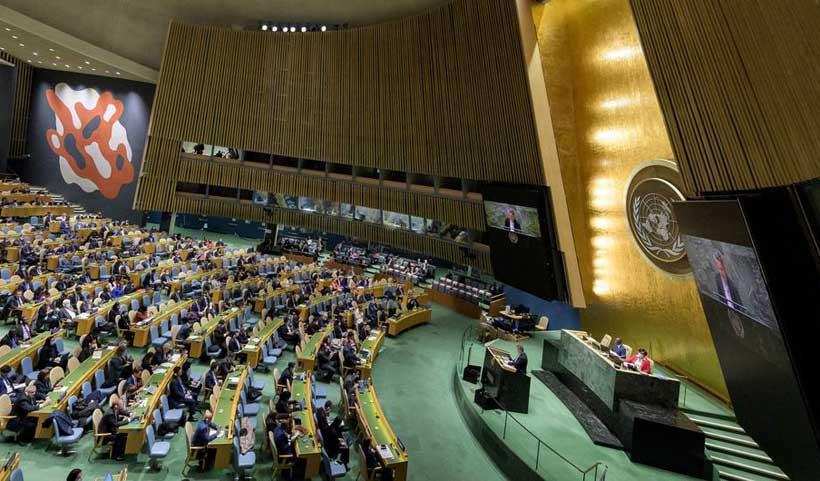By
Sahibzada M. Usman, Ph.D.
Africa-Press – Mauritius. The 80th session of the United Nations General Assembly (UNGA) opened on 9 September 2025 with the theme “Better together: 80 years and more for peace, development and human rights.” It is a theme that carries the weight of global aspirations for cooperation in the face of complex challenges, from climate change to conflict, from inequality to humanitarian crises. For Pakistan, however, this year’s session is more than a ceremonial reflection. It is a critical opportunity to underscore how unilateral actions by its neighbour, India, undermine not only peace and stability in South Asia but also the very principles of shared responsibility that the UNGA seeks to promote.
At the heart of the matter lies the weaponization of water, a disturbing trend that runs directly counter to the spirit of “Better together.” For decades, the Indus Waters Treaty (IWT) of 1960 stood as a rare model of cooperation between India and Pakistan, two nuclear-armed rivals whose relationship has otherwise been defined by mistrust, hostility, and conflict. Brokered by the World Bank, the IWT allocated the waters of the Indus River system in a way that sought to balance needs, mitigate disputes, and provide stability. Remarkably, it survived wars, border crises, and diplomatic freezes, emerging as a beacon of functional cooperation in an otherwise volatile neighbourhood.
That durability ended in May 2025, when India unilaterally suspended the treaty. The decision marked a grave escalation, transforming a basic human necessity protected under international law into a tool of coercion. By halting cooperation on water sharing, New Delhi not only disrupted a delicate balance but also signalled that long-standing treaties can be held hostage to political calculations. Such a precedent threatens not just Pakistan but the entire global order, where international law discourages the suspension of treaties under political duress. If the IWT can be disregarded after six decades, what does that say about the sanctity of other multilateral agreements painstakingly built to preserve peace?
The implications for Pakistan are dire. The Indus River system is not a luxury but a lifeline. It provides 23 percent of Pakistan’s agricultural water requirements and sustains nearly 68 percent of rural livelihoods. For millions of farmers and communities, uninterrupted river flows are the difference between sustenance and starvation. A disruption in this lifeline risks plunging Pakistan into food insecurity, economic instability, and humanitarian crises that could ripple across the wider region. In a world already grappling with climate-induced water stress, weaponizing rivers exacerbates vulnerabilities and undermines the collective pursuit of development and stability.
India’s escalation did not stop with the suspension of the IWT. On 26 August 2025, it released massive volumes of water from overflowing dams into Pakistan’s low-lying border areas. The timing and scale of the release left little doubt about its recklessness. The resulting floods displaced more than 200,000 people, claimed 15 lives, and devastated swathes of Punjab’s agricultural land. This was not a natural calamity in isolation; it was a man-made disaster enabled by the manipulation of a shared resource. Water, the very element of life, was wielded as a weapon of destruction.
Such actions raise profound questions for the international community. Can water, the most basic of human needs, be allowed to become a bargaining chip in geopolitical disputes? Can unilateral aggression against shared rivers be tolerated when it violates both the letter and spirit of international agreements? The answers must be unequivocal. Weaponizing water is a violation of humanitarian principles and a dangerous departure from established norms of cooperation.
The UNGA, in its 80th session, must confront this reality. Its theme of “Better together” rings hollow if powerful states are permitted to flout cooperation at the expense of human lives. For Pakistan, safeguarding the Indus Waters Treaty is not merely about survival but about preserving a symbol of multilateralism that has long stood against the tide of hostility. The IWT embodies what the UN seeks to achieve: durable frameworks of cooperation that withstand crises and keep peace possible. Its erosion signals not just a regional breakdown but a failure of global governance to defend the integrity of cooperative agreements.
The broader implications extend beyond South Asia. If international treaties governing critical resources can be suspended without consequence, what message does that send about agreements on climate change, nuclear non-proliferation, or trade? Multilateralism cannot thrive in a world where selective adherence becomes the norm. The credibility of the UN system itself depends on its ability to safeguard such agreements and hold violators accountable.
The weaponization of water also highlights the urgent need to reframe how the international community addresses shared natural resources. In an age of climate change, when rivers are shrinking, glaciers are melting, and droughts are intensifying, cooperative water governance is no longer optional, it is existential. The Indus basin, already under stress from declining flows due to global warming, cannot sustain unilateral disruptions. Instead, it demands a renewed commitment to joint stewardship, scientific collaboration, and mechanisms that prioritize human security over political manoeuvring.
For Pakistan, the UNGA platform is a chance to remind the world that peace and development cannot be compartmentalized. Food security, livelihoods, and survival are as integral to human rights as freedom and dignity. India’s actions must be recognized not only as aggression against Pakistan but as an assault on the very principles the UN upholds. The suspension of the IWT and the reckless release of dam waters are stark reminders of how fragile cooperative frameworks can be and how urgently they must be defended.
The choice before the UNGA is clear. It can allow the erosion of one of the world’s most enduring water-sharing agreements, thereby legitimizing the use of essential resources as instruments of coercion. Or it can reaffirm its commitment to multilateralism, to “Better together,” by standing with Pakistan in defending the sanctity of the Indus Waters Treaty and the principle of fair water-sharing. The stakes are not only about rivers flowing into Pakistan but about the credibility of the global system itself.
As Pakistan raises its voice at the 80th UNGA, it is not just pleading for its own survival but calling for the preservation of a global order where peace, development, and human rights remain achievable.
moderndiplomacy
For More News And Analysis About Mauritius Follow Africa-Press







